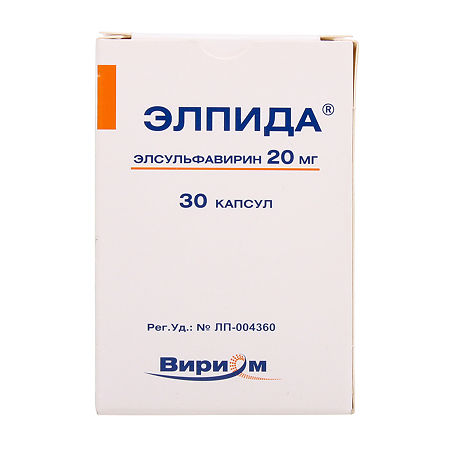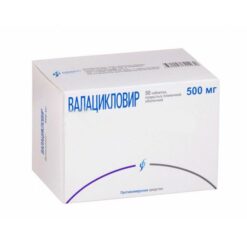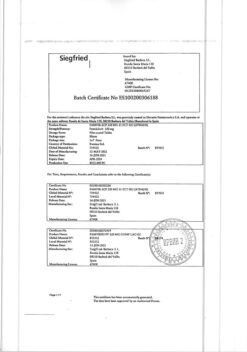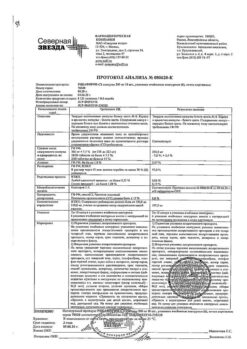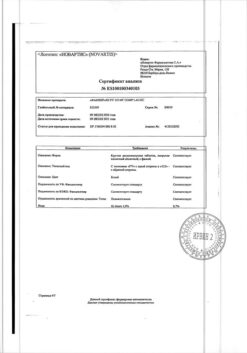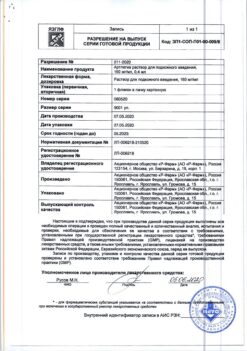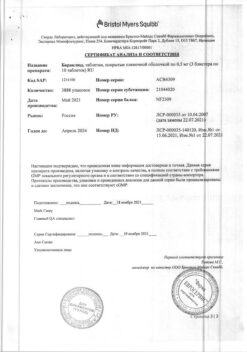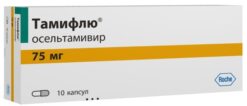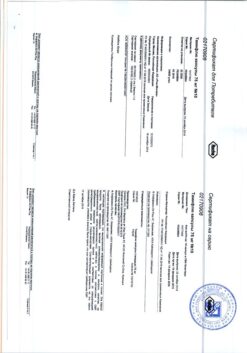No products in the cart.
Description
Treatment of HIV-1 infection in adults as part of combination antiretroviral therapy.
Indications
Indications
Treatment of HIV-1 infection in adults as part of combination antiretroviral therapy.
Special instructions
Special instructions
Patients should be warned that current antiretroviral drugs do not cure HIV infection or prevent the transmission of HIV infection to others through blood or sexual contact. Patients should continue to take appropriate precautions during treatment with Elpida.
Elpida is not used as monotherapy for the treatment of HIV infection (may lead to the development of viral resistance) or as the only drug added to ineffective treatment. Treatment should be carried out by a doctor with sufficient experience in treating HIV infection.
Considering the tropism of the active metabolite to blood cells, it is necessary to prescribe Elpida with caution to patients with severe anemia and pancytopenia.
Related APT
If any antiretroviral drug in combination APT is discontinued due to suspected intolerance, consideration should be given to stopping all antiretroviral drugs at the same time. All discontinued antiretroviral drugs should be resumed immediately after symptoms of intolerance have resolved. Interrupted monotherapy and sequential re-prescription of antiretroviral drugs are not recommended due to the increased likelihood of the emergence of treatment-resistant virus.
Food influence
Food intake affects the absorption kinetics of Elpida, significantly reducing the degree of its absorption, therefore taking Elpida is recommended on an empty stomach.
Allergic reactions
In clinical studies conducted, no allergic reactions were recorded when taking Elpida.
Immune reconstitution syndrome
In HIV-infected patients with severe immunodeficiency, at the beginning of combined APT, an inflammatory reaction may occur in response to the activation of pathogens of asymptomatic or residual opportunistic infections, which can lead to serious clinical conditions or worsening of symptoms. These reactions usually occur within the first weeks or months after starting comprehensive APT. Typical examples are cytomegalovirus retinitis, generalized and/or focal mycobacterial infection, and pneumonia caused by Pneumocystis jiroveci (P. carinii). The appearance of any symptoms of inflammation requires examination and, if necessary, treatment. Autoimmune diseases (such as Graves’ disease) have also been observed in the setting of immune reconstitution, but the timing of initial manifestations varies and the disease may occur many months after the start of therapy.
Body weight and metabolic parameters
During APT, there may be an increase in body weight and an increase in the concentration of glucose and lipids in the blood. These changes may be partly related to the disease itself and lifestyle. In some cases, the effect of therapy on increasing lipid concentrations has been proven, but there is no convincing evidence of the effect of therapy on weight gain. Monitoring of blood glucose and lipid concentrations should be carried out in accordance with recommendations for the treatment of HIV infection. Lipid imbalances should be corrected if clinically necessary.
Lipodystrophy and metabolic disorders
Combined APT is associated with redistribution of subcutaneous body fat (lipodystrophy) in HIV-infected patients. The long-term consequences of this phenomenon are still unknown and the mechanism of its development has not been sufficiently studied. An association of visceral lipomatosis with the use of HIV protease inhibitors and lipoatrophy with the use of NRTIs has been suggested. The increased risk of developing lipodystrophy may be due to both individual factors, such as older age, and drug-related factors, such as prolonged APT and associated metabolic disorders. In this regard, during the clinical examination of the patient, a physical examination should be carried out, paying attention to the redistribution of subcutaneous fat, and also determine the concentration of lipids in the blood serum and the concentration of glucose in the fasting blood plasma. Violations should be corrected according to clinical manifestations.
Osteonecrosis
Although the etiology of this disease is recognized as multifactorial (including the use of glucocorticosteroids, alcohol abuse, severe immunosuppression, increased body mass index), cases of osteonecrosis have been observed primarily in patients with long-term HIV infection and/or in patients receiving long-term combined APT. Patients should consult a doctor immediately if they experience joint pain, decreased joint mobility, or difficulty walking. These reactions were not recorded in clinical studies of Elpida.
Special patient groups
Patients with liver disease
The pharmacokinetics of Elpida in patients with impaired liver function have not been studied. Elpida is contraindicated in patients with moderate to severe liver dysfunction (Child-Pugh class B and C) (see “Contraindications”, “Pharmacological properties”). Due to the metabolism of Elpida by the cytochrome P450 system and limited clinical experience with the drug in patients with chronic liver diseases, caution should be exercised when prescribing Elpida to patients with mild liver disease (Child-Pugh class A). In this case, patients should be monitored for timely detection of dose-dependent adverse reactions, especially from the nervous system. Laboratory tests should also be performed at regular intervals to assess the condition of the liver.
The safety and effectiveness of Elpida have not been confirmed in patients with liver cirrhosis of any etiology. Elpida has not been studied in patients with co-infection with HIV-1 and hepatitis B and/or C viruses. Patients with chronic hepatitis B or C taking combination APT are at risk of developing severe hepatic adverse reactions, which can be fatal. Patients with a history of hepatic impairment, including chronic hepatitis, have an increased incidence of liver dysfunction with combined APT, and such patients should be monitored according to a standard regimen. In patients with worsening liver disease or persistent increases in serum aminotransferase levels greater than 5 times the upper limit of normal, the benefit of continued Elpida therapy must be weighed against the potential risk of hepatotoxicity. In such patients, the advisability of interrupting or discontinuing APT should be considered. When using other drugs with known hepatotoxicity simultaneously, it is recommended to monitor the activity of serum aminotransferases.
Patients with kidney failure
Elpida studies did not include patients with GFR <60 mL/min. The pharmacokinetics of Elpida in patients with renal failure have not been studied, however, impaired renal function should not have a significant effect on the elimination of the drug (see section "Pharmacological properties"). There is no experience with the use of Elpida in patients with moderate and severe renal failure, and therefore the use of the drug in such patients is contraindicated (see section "Contraindications").
Patients with co-infection
Elpida has not been studied in patients with co-infection with HIV-1 and hepatitis B, C viruses and/or tuberculosis.
Elderly patients
Elpida has not been studied in elderly patients.
Children
Elpida has not been studied in children under 18 years of age (see section “Contraindications”).
Impact on the ability to drive vehicles. Wed and fur.:
There have been no studies of the drug Elpida to evaluate the effect on the ability to drive vehicles or operate machinery. Patients should be warned that if they experience insomnia, dizziness and other undesirable reactions from the central nervous system, they should avoid driving vehicles and machinery.
Active ingredient
Active ingredient
Elsulfavirin
Composition
Composition
1 capsule contains:
active ingredient:
elsulfavirin sodium 20.7 mg (in terms of elsulfavirin 20.0 mg);
excipients:
lactose monohydrate,
croscarmellose sodium,
povidone-K30,
magnesium stearate;
hard gelatin capsule:
titanium dioxide (E171), crimson dye [Ponceau 4R] (E124), red iron oxide dye (E172), gelatin.
Contraindications
Contraindications
– Hypersensitivity to elsulfavirin sodium or any other component of the drug.
– Lactose intolerance, lactase deficiency and glucose-galactose malabsorption syndrome (the drug contains lactose).
– Children under 18 years of age.
– Pregnancy and breastfeeding period.
– Patients with moderate to severe renal impairment (GFR < 60 ml/min).
– Patients with moderate to severe liver dysfunction (Child-Pugh class B and C).
With caution:
– Patients with severe anemia and pancytopenia.
– Simultaneous use with drugs whose metabolism occurs with the participation of cytochrome P450 isoenzymes CYP2B6 and CYP3A4 (see section “Interaction with other drugs”).
– Patients with mild liver dysfunction (Child-Pugh class A) (see section “Special Instructions”).
Side Effects
Side Effects
The frequency of adverse drug reactions by organs and systems is given according to the classification of the World Health Organization (WHO) and taking into account the size of the general population of patients with HIV infection who were treated with Elpida as part of clinical trials: very often (≥ 1/10) – more than 10 cases; often (≥ 1/100, < 1/10) - from 2 to 10 cases, infrequently (≥ 1/1000, < 1/100) - a single case, rarely (≥ 1/10000, < 1/1000) - not applicable, very rarely (< 1/10000) - not applicable.
Infectious and parasitic diseases: often – herpes simplex; uncommon – genital herpes, oral herpes, fungal infection.
Disorders of the blood and lymphatic system: often – leukopenia, neutropenia.
Endocrine system disorders: uncommon – autoimmune thyroiditis.
Mental disorders: often – sleep disorder, depressive states (depressed mood), anxiety, apathy, irritability; infrequently – aggression, mood changes, impaired attention, obsessive thoughts, nightmares.
Nervous system disorders: very often – headache; often – dizziness, unusual dreams, drowsiness; uncommon – decreased concentration, memory impairment, insomnia, decreased sleep quality, impaired taste sensitivity, paresthesia.
Hearing and labyrinthine disorders: uncommon – hyperacusis, tinnitus.
Disorders of the respiratory system, chest and mediastinal organs: infrequently – cough, shortness of breath, pain in the oropharynx, rhinorrhea, disturbance of smell.
Gastrointestinal disorders: often – nausea, diarrhea, dry mouth. vomit; uncommon – abdominal discomfort, abdominal pain, belching, glossalgia, colitis.
Disorders of the skin and subcutaneous tissues: often – rash, itching; infrequently – hair loss, furunculosis.
Musculoskeletal and connective tissue disorders: infrequently – arthralgia.
Renal and urinary tract disorders: often – mild proteinuria, polyuria; infrequently – urolithiasis, leukocyturia.
Disorders of the genital organs and mammary gland: infrequently – delayed menstruation, polymenorrhea, sexual dysfunction.
General disorders and disorders at the injection site: often – asthenia, weakness, decreased appetite, increased body temperature; infrequently – chest pain.
Laboratory and instrumental data: very often – increased activity of gamma-glutamyltransferase (GGT); often – increased alanine aminotransferase (ALT) activity, increased creatine phosphokinase (CPK) activity, increased blood glucose levels; uncommon – increased aspartate aminotransferase (AST) activity, increased blood pressure, weight loss. If any of the side effects indicated in the instructions get worse or you notice any other side effects not listed in the instructions, tell your doctor.
Interaction
Interaction
Antiretroviral drugs
As part of a phase 3 clinical trial, Elpida was used as part of a complex APT with a fixed combination of 2 NRTIs – tenofovir and emtricitabine. This combination of drugs was well tolerated by patients.
A clinical drug-drug interaction study examined the use of Elpida in combination with the HIV protease inhibitors darunavir and ritonavir, as well as the integrase inhibitor raltegravir. In general, the combined use of drugs was well tolerated. Changes in the pharmacokinetic parameters and exposure of drugs are insignificant and do not require changes to the standard dosage regimen of these drugs. Administration of atazanavir after completion of Elpida therapy in another clinical trial resulted in the development of severe gastrointestinal adverse reactions (nausea, vomiting) characteristic of atazanavir.
Other medicines
Elpida induces the activity of the CYP2B6 and CYP3A4 isoenzymes and may reduce plasma concentrations and, therefore, reduce the activity of drugs that are substrates of these isoenzymes. Taking these drugs together should be done with caution.
Substrates of the isoenzymes CYP2B6 and CYP3A4, whose activity may be reduced when taken together with Elpida
Substrates of CYP2B6 and CYP3A4:
Immunosuppressants (cyclosporine, tacrolimus, sirolimus).
Chemotherapy drugs (docetaxel, tamoxifen, paclitaxel, cyclophosphamide, doxorubicin, erlotinib, etoposide, ifosfamide, teniposide, vinblastine, vincristine, vindesine, imatinib, sorafenib, sunitinib, vemurafenib, temsirolimus, anastrozole, genfatinib).
Azole antifungals (ketoconazole, itraconazole).
Macrolides (clarithromycin, erythromycin, telithromycin; except azithromycin). Tricyclic antidepressants (amitriptyline, clomipramine, imipramine, cyclobenzaprine).
Selective serotonin reuptake inhibitors (citalopram, norfluoxetine, sertraline).
Other antidepressants (mirtazapine, nefazodone, reboxetine, venlafaxine, trazodone). Antipsychotics (haloperidol, aripiprazole, risperidone, ziprasidone, pimozide).
Opioid analgesics (alfentanil, buprenorphine, codeine, fentanyl, hydrocodone, methadone, levacetylmethadol, tramadol).
Benzodiazepines (alprozolam, midazolam, triazolam, diazepam).
Sleeping pills (zopiclone, zaleplon, zolpidem).
Statins (atorvastatin, lovastatin, simvastatin, cerivastatin; except pravastatin and rosuvastatin).
Calcium channel blockers (diltiazem, felodipine, nifedipine, verapamil, amlodipine, lercanidipine, nitrendipine, nisoldipine, bepridil).
Antiarrhythmics (amiodarone, dropedarone, quinidine).
Phosphodiesterase-5 inhibitors (sildenafil, tadalafil).
Agonists and antagonists of sex hormones (finasteride, estradiol, progesterone, ethinyl estradiol, testosterone, toremifene, bicalutamide).
H1 receptor antagonists (terfenadine, astemizole, chlorphenamine).
HIV protease inhibitors (indinavir, ritonavir, saquinavir, nelfinavir).
Some glucocorticosteroids (budesonide, hydrocortisone, dexamethasone).
Other CYP2B6 substrates:
Bupropion, valproic acid, methoxetamine, propofol, efavirenz.
Other CYP3A4 substrates:
Aprepitant, buspirone, warfarin, dapsone, domperidone, donepezil, caffeine, clopidogrel, lidocaine, montelukast, nateglinide, nevirapine, omeprazole, ondansetron, propranolol, salmeterol, cisapride, eplerenone, ergot alkaloids (ergotamine, dihydroergotamine, ergonovine, methylergonovine).
Overdose
Overdose
As part of clinical studies, patients took Elpida once at a dose of up to 80 mg and repeatedly (for at least 12 weeks) at a dose of 40 mg. Taking Elpida at a dose of 40 mg per day led to a more frequent (compared to the recommended dose) development of adverse reactions from the nervous system and psyche, as well as to the appearance of reactions from the skin (rash).
In case of overdose, treatment should consist of taking measures to reduce the absorption of the drug (gastric lavage, taking adsorbents), monitoring vital signs and the condition of the main organs and systems. Activated charcoal can be used to speed up the elimination of unabsorbed drug. There is no specific antidote.
Clinical pharmacology
Clinical pharmacology
Pharmacotherapeutic group:
Antiviral (HIV) agent
ATX:
J.05.A.G Non-nucleosides – reverse transcriptase inhibitors
Pharmacodynamics:
Elsulfavirine sodium is rapidly metabolized in the liver to form an active metabolite, which is a non-nucleoside reverse transcriptase inhibitor (NNRTI) of human immunodeficiency virus 1 (HIV-1). The active metabolite inhibits HIV-1 reverse transcriptase and does not inhibit HIV-2 reverse transcriptase and DNA polymerase (α, β, γ and δ) of human cells.
Antiviral activity in vitro
The concentration of the active metabolite at which 50% inhibition of the activity (IC50) of wild-type recombinant HIV-1 reverse transcriptase enzyme (HIV-RT) (strain HXB2) is observed in vitro is 1.2 nmol. The main mutations of recombinant HIV-RT (L100I, K103N, V106A, E138K, Y181C, G190A, M230L, L101I/K103N, K103N/Y181C, V179F/Y181C), resistant to other NNRTIs, were sensitive to Elpida. In in vitro experiments on MT-4 cell cultures infected with HIV-1, for four mutant viruses with mutations in the coding part of the HIV-RT gene (V106A, G190A) and double mutants (L100I/K103N and K103N/Y181 C), the corresponding IC50 values were close to those obtained for wild-type HIV-1 (strain HXB2). The average fold shift from HXB2 for inhibition of replication of mutants V106A, G190A, L100I/K103N and K103N/Y181C did not exceed 1.0.
The effect of human serum proteins on the antiviral activity of the active metabolite was determined in MT-4 cell culture in the presence of 40% human serum. Replication of wild-type HIV-1 (strain HXB2) was suppressed by the active metabolite, with an average IC value of 1.3 nmol in standard culture medium; in a medium containing 40% human serum, the average IC50 value was 13.8 nmol, which corresponds to an increase of 10.6 times.
Resistance
In in vitro experiments on MT-4 cell cultures infected with wild-type HIV-1 (strain HXB2D), virus variants with reduced sensitivity to the drug Elpida were selected. The most common mutation was the double mutation V106I/A + F227C, which also greatly reduced the viability of the virus (by 94%). This combination was often accompanied by one or more additional mutations: A98G, VI081, E138K, M230L, P236L. Another common combination was the double mutation VI061 + Y188L, often with one or more additional mutations: L1001, E138K, Y181C.
In vitro experiments have shown that Elpida has a higher genetic barrier to resistance compared to other NNRTIs. For the emergence of significant resistance to the drug Elpida, not one mutation is required, but a combination of at least two, often three or more mutations.
Cross resistance
The antiviral activity of Elpida was determined on a panel of 50 recombinant viruses obtained from plasma samples from patients infected with HIV who had previously received NNRTI-based antiretroviral therapy (APT). The frequency of mutations in the coding sequence of the HIV-RT gene associated with the emergence of resistance to used NNRTIs in the studied panel of 50 viruses was similar to the values recorded in current versions of the HIV-RT gene databases. The most common mutations in this panel were K103N (54%), Y181C (41%), G190A (41%), K101E (17%), A98G/S (37%), V108I (24%), L100I (9%), P225H (9%), V179I (15%), K103R (11%), K103S, G190S, V179D, V106A, V106I, Y188L (4-7%) and M230L (2%). All 50 viruses were highly resistant to the inhibitory effect of efavirenz. Elpida inhibited the replication of 46 of 50 efavirenz-resistant viruses with IC50 values below 10 nmol. When corrected for protein binding in the presence of 40% human serum, Elpida inhibited the replication of 92% of viruses tested with IC values below 100 nmol. In contrast, the reference compounds efavirenz and etravirine inhibited replication in 0% and 62% of viruses tested, respectively, with IC values below 10 nmol.
Elpida has a wide spectrum of antiviral activity against various strains and clinical isolates of HIV infection, including those resistant to other NNRTIs.
Elpida specifically inhibits the DNA polymerase activity of HIV-RT in vitro, including those with mutations V106A, G190A, L100I/K103N and K103N/Y181C. Cross-resistance between Elpida and other NNRTIs was not observed in in vitro experiments.
Pharmacokinetics:
Suction
After oral administration, Elpida is rapidly absorbed into the systemic circulation. The maximum concentration (Cmax) of the active metabolite with a single dose of Elpida at a dose of 20 mg averages 98 ng/ml and is achieved within 3.5 hours. With repeated doses of Elpida at a dose of 20 mg/day, the Cmax of the active metabolite in the blood plasma is 164 ng/ml and is achieved in 7-8 days.
Effect of food on absorption
Eating reduces the degree of absorption of Elpida, which leads to a decrease in Cmax of the active metabolite by 4-5 times and the coefficient of variation for the area under the concentration-time curve (AUC) by 1.5-2 times. At the same time, a 2-fold increase in the time to reach maximum concentration (Tmax) indicates a slower absorption. In this regard, Elpida is recommended to be taken on an empty stomach 15 minutes before meals.
Distribution
The active metabolite is deposited in the formed elements of the blood, where its content is significantly higher than in plasma. The Cmax value of the active metabolite in blood cells is 1041 ng/ml and is achieved after 6 days of taking Elpida at a dose of 20 mg/day.
Metabolism
The metabolic stability of elsulfavirin in liver microsomes and hepatocytes of rats, dogs, monkeys and humans was assessed as quite low; in the S9 fraction, elsulfavirin was quickly converted into an active metabolite.
The metabolic stability of the active metabolite in liver microsomes and hepatocytes of rats, dogs, monkeys and humans was assessed as quite high, indicating its insignificant level of metabolism. Its main metabolites in hepatocytes were hydroxylation products followed by glucuronidation, as well as acid and aminosulfonamide.
Elpida has virtually no inhibitory effect on cytochrome P450 isoforms (CYP1A2, CYP2C9, CYP2C19, CYP2D6, CYP2E1, CYP3A4) at concentrations > 50 μmol in human liver microsomes.
Elpida is an inducer of mRNA expression of the CYP2B6 and CYP3A4 isoenzymes, and also strongly induces the activity of CYP3A4. The degree of induction of the CYP3A4 enzyme and mRNA expression by the active metabolite significantly exceeds the inducing effect of efavirenz and rifampicin. The maximum inducing effect of the active metabolite of the drug Elpida on CYP3A4 at a concentration of 0.1 µM was comparable to efavirenz and rifampicin at a concentration of 10 µM.
In this regard, it should be used with caution in combination with drugs whose metabolism occurs with the participation of the CYP2B6 and CYP3A4 isoforms of cytochrome P450 (see section “Interaction with other drugs”).
Removal
Elpida is excreted primarily in bile in the form of glucuronide metabolites. The half-life (T1/2) of the active metabolite from blood plasma is 7-9 days.
Pharmacokinetics in special groups of patients
Liver dysfunction
The pharmacokinetics of Elpida in patients with impaired liver function have not been studied.
Renal dysfunction
The pharmacokinetics of Elpida in patients with glomerular filtration rate (GFR) less than 60 ml/min have not been studied.
Gender and race
Similar pharmacokinetic parameters were observed in men and women, as well as in patients of different races.
Elderly patients
The pharmacokinetics of Elpida have not been studied in patients over 65 years of age.
Children
Pharmacokinetics in patients under 18 years of age have not been studied.
Storage conditions
Storage conditions
In a place protected from light at a temperature not exceeding 25 ° C. Keep out of the reach of children.
Shelf life
Shelf life
2 years.
Manufacturer
Manufacturer
IIHR LLC, Russia
Additional information
| Shelf life | 2 years. |
|---|---|
| Conditions of storage | Store in a dark place at a temperature not exceeding 25 °С. Keep out of reach of children. |
| Manufacturer | IIHR JSC, Russia |
| Brand | IIHR JSC |
Related products
Buy Elpida capsules 20 mg, 30 pcs. with delivery to USA, UK, Europe and over 120 other countries.

